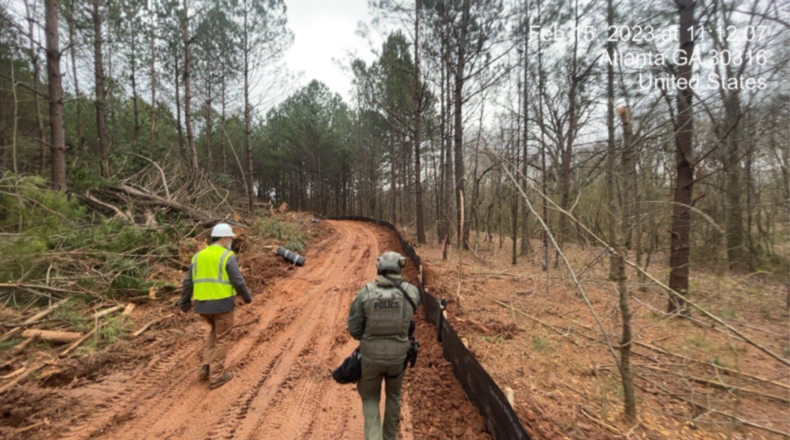The DeKalb Zoning Board of Appeals unanimously sided with the city of Atlanta and denied an appeal of the issued land disturbance permits for construction of the city’s controversial public safety training center.
The ruling found that the county’s lengthy process to issue the permits complied with all requirements, and denied a request to halt the project.
DeKalb County gave the OK for construction to begin in January, nearly a year after Atlanta applied for land disturbance permits to build the controversial facility.
In February, local resident Amy Taylor filed a formal appeal of the permits. Carolyn Tucker and DeKalb County Commissioner Ted Terry are also part of the effort. Tucker is another neighborhood resident and Terry’s district includes the training center property.
The appeal accuses the city and county of overlooking existing restrictions on sediment discharges.
Jon Schwartz, lawyer for the appellants, argued that sediment levels in the watershed are already well over the limit needed to sustain its ecosystem, and that continuing construction will violate Georgia water quality standards.
“No one, including the police, is above the law,” he said. “We only ask that you uphold the law.”
Leah Ward Sears, a lawyer for DeKalb County and former Chief Justice of the Georgia Supreme Court, said that the question in front of the board was whether or not the county’s planning director acted appropriately when they OK’d the permits.
“The facts show that the land development permit was issued only after it was carefully reviewed by experienced knowledgeable professionals — following 11 months of intensive review,” she said. “There’s no basis, at this point, for second guessing this process or the ultimate decision.”
Simon Bloom, a lawyer representing the city of Atlanta and the Atlanta Police Foundation, argued that appellants are asking the board to question decisions made by the Environmental Protection Division. The state’s environmental agency already signed off multiple times on construction of the site, so long as the project adheres to an agreed upon sediment erosion plan.
Bloom said the site is under intense watch to make sure proper precautions are taken.
“This is the most watched real estate development project in the region,” he said. “It’s being inspected every single day — which is outlandish.”
But environmental experts say sediment levels are already threatening wildlife.
Dr. Sarah Ledford, an urban hydrologist and assistant professor of geosciences at Georgia State University, submitted testimony on the sediment levels in Intrenchment Creek prior to, and resulting from, tree clearing that’s already taken place.
“Clearing portions of the site has already increased sediment loading from red clay soil into Intrenchment Creek,” she said, and warned that further activity will harm aquatic life.
A Fulton County judge previously tossed out the same argument that would have pressed pause on construction. Superior Court Judge Thomas A. Cox Jr. ruled against plaintiffs — Taylor, Terry and the South River Watershed Alliance.
Cox denied their request to issue an emergency Temporary Restraining Order that would have halted work at the site until the matter was heard by the county’s Zoning Board of Appeals.
He also ruled that the City of Atlanta is not subject to DeKalb County zoning ordinances on city-owned land.
Commission members said the debate had gone beyond the question they were asked to review: did the county’s planning director act within the law when issuing the land permits?
“I understand the concerns, even members of my own family are opposed to this training center,” said Board Member Mark Goldman. “But that’s not what’s before us.”
‘Balls and strikes’
DeKalb County officials have been caught in the middle of the controversy since the county is home to the South River Forest and construction site. The city of Atlanta owns the land.
Terry said it was “disappointing” that the zoning appeals board voted to move forward with the project.
But DeKalb CEO Michael Thurmond said Wednesday ahead of the appeals hearing that it’s the local government’s job to be the “regulators.”
“We’re the umpire between people who support the training center and those who oppose it,” Thurmond said on Georgia Public Broadcasting’s Political Rewind. “Our job is to call balls and strikes. That’s what we have done and that’s what we’ll continue to do.
“We just want to do our job in a fair and objective way.”
Thurmond recently issued an executive order that closed down Intrenchment Creek Park due to “dangerous and possible life-threatening conditions,” saying the GBI had found booby traps, including boards with nails protruding from them, planted throughout the park.
The order closed and restricted access to the park and other county owned properties, totaling approximately 140 acres, until further notice.
Former DeKalb County Commissioner Kathie Gannon, who used to represent the district that holds the facility, also urged the zoning board to walk back on their decision. She said that along with the potential negative impact on the environment, DeKalb County residents’ concerns have gone unheard.
“The South River and Intrenchment Creek have been in the stewardship of DeKalb County for a very long time,” she wrote. “We have not been good stewards.”
Atlanta officials were anxiously awaiting the zoning board’s decision, too, on Wednesday. Atlanta Mayor Andre Dickens said in a statement that the project has undergone over a year of review and was signed off on by local governments as well as environmental agencies.
”Every part of this project has been scrutinized and has been found to be fully compliant with the law and all environmental protection requirements,” Dickens said.
About the Author
Keep Reading
The Latest
Featured




